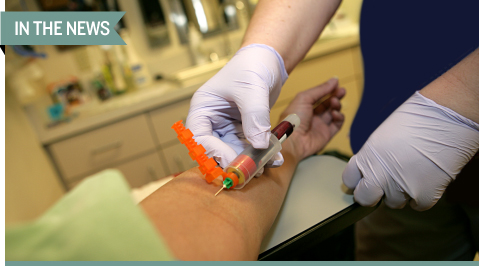
Image Credit: iStock.com / ftwitty
Doctors typically rely on computed tomography (CT) to find evidence of intracranial lesions or brain tissue damage. How effective it is for analyzing mild head trauma is under question: Patients who present to emergency departments with head injuries often yield negative scans, and the procedure itself subjects them to additional radiation.
A new in vitro blood test may serve as an antidote. The Food and Drug Administration (FDA) for the first time has approved a blood test for detecting mild traumatic brain injury (mTBI) or concussion, leveraging its Breakthrough Devices Program to review and authorize the test within 6 months. The program expedites approvals for novel technologies and devices that could lead to life-saving diagnoses or treatments for serious diseases.
The test, known as the Banyan Brain Trauma Indicator, measures two brain-specific proteins, UCH-L1 and GFAP, that appear after head trauma to assess the probability of intracranial damage after an mTBI. The test produces results within several hours.
FDA granted approval for Banyan Biomarkers Inc. to market the test following a performance review that involved more than 2,000 patients at multiple centers in the United States and the European Union. The agency compared the test’s results with CT scans of patients who presented to emergency departments with suspected concussion. The test was able to forecast the presence of intracranial lesions on a CT scan with more than 97% accuracy and the absence of head injury on a scan with 99.6% accuracy.
“A blood-testing option for the evaluation of mTBI/concussion not only provides health care professionals with a new tool but also sets the stage for a more modernized standard of care for testing of suspected cases,” said FDA Commissioner Scott Gottlieb, MD in a statement. The goal is to save healthcare costs by performing fewer CT scans on patients with suspected concussion. FDA’s approval of the Banyan Brain Trauma Indicator also supports its initiative to reduce patients’ exposure to radiation from medical imaging, Gottlieb said. This effort ensures that patients get the correct imaging exam at the right time and dose.
Some believe the test will be a game changer. “This is going to change the testing paradigm for suspected cases of concussion,” FDA spokesperson Tara Rabin told The New York Times.
However, it’s not going to make CT scans obsolete. Those scans are still necessary and useful for ruling out a clinically significant brain injury that requires surgery, Jay Alberts, PhD, who directs the Cleveland Clinic’s Concussion Center, told NBC News.
Experts say the test’s main purpose is to rule out doubt of a concussion in cases of mild head trauma.